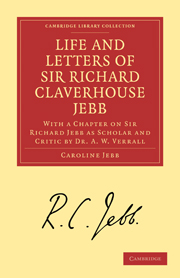 Life and Letters of Sir Richard Claverhouse Jebb, O. M., Litt. D.
Life and Letters of Sir Richard Claverhouse Jebb, O. M., Litt. D. Published online by Cambridge University Press: 07 September 2010
The new Parliament met on February 13th, 1896, with Lord Salisbury as Prime Minister. On the 31st of March, Sir John Gorst, Vice-President of the Committee of Council on Education, introduced an Education Bill in a lucid and able speech. It found many friends among the organizations devoted to education. The National Union of Teachers gave it almost unqualified approval, and indulged in prophecies of the good that would follow its adoption.
The fate of the Bill is an old story now. It failed then as other Education Bills have failed since. To attempt to explain its provisions here would be needless, but something must be said of it as part of the parliamentary life of Richard Jebb. Keenly interested in its success, he spoke on both the first and second readings, the second speech being held by some to be the finest he had yet delivered in the House. It was described as a “masterly vindication of the principle and scheme of the Bill—the more weighty and effective because conjoint with a considerable amount of trenchant and independent criticism of questions of detail.” Mr Haldane, who rose when Jebb sat down, said,
“The House had listened to two speeches from the benches behind the Government, both of them by remarkable men, both of them characterised by unusual felicity of diction and both in defence of the Bill, though in different ways. The speech to which they had just listened was that of an honourable member who represented a University constituency—the very hotbed of the old Toryism—but it was one which might have been made by an Old Liberal.”
To save this book to your Kindle, first ensure [email protected] is added to your Approved Personal Document E-mail List under your Personal Document Settings on the Manage Your Content and Devices page of your Amazon account. Then enter the ‘name’ part of your Kindle email address below. Find out more about saving to your Kindle.
Note you can select to save to either the @free.kindle.com or @kindle.com variations. ‘@free.kindle.com’ emails are free but can only be saved to your device when it is connected to wi-fi. ‘@kindle.com’ emails can be delivered even when you are not connected to wi-fi, but note that service fees apply.
Find out more about the Kindle Personal Document Service.
To save content items to your account, please confirm that you agree to abide by our usage policies. If this is the first time you use this feature, you will be asked to authorise Cambridge Core to connect with your account. Find out more about saving content to Dropbox.
To save content items to your account, please confirm that you agree to abide by our usage policies. If this is the first time you use this feature, you will be asked to authorise Cambridge Core to connect with your account. Find out more about saving content to Google Drive.